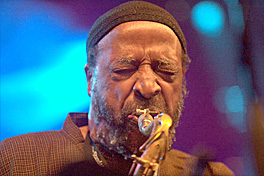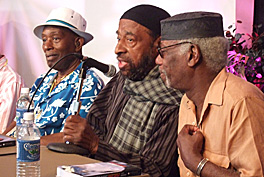Yusef Lateef Passes
By Lars Bjorn
One of the true giants of Detroit jazz, Yusef Lateef, died on December 23, 2013, at his home in Shutesbury, Mass., 93 years of age. He was a path-breaking musician who introduced Middle Eastern and Asian sounds in 1957, several years before it became commonplace in modern jazz.
 Lateef's main instrument was the tenor saxophone, but he was also a remarkable flutist and (a pioneer) oboist. Many of his musical concepts were worked out at a long residency by his quintet at Klein's Show Bar on 12th Street in Detroit from 1956 to 1959. During his stay at Klein's, Lateef recorded six LPs for Savoy and Verve (in New York) with a group that included two exceptional young Detroiters: trombonist Curtis Fuller and drummer Louis Hayes. Anyone who has listened to Lateef on Before Dawn (Verve) knows that here is a full-fledged artist with something unique and emotionally powerful to say. By the time he made his final move to New York City in 1960, he was readily integrated into the very best modern jazz groups led by Charles Mingus and Cannonball Adderley. Lateef's main instrument was the tenor saxophone, but he was also a remarkable flutist and (a pioneer) oboist. Many of his musical concepts were worked out at a long residency by his quintet at Klein's Show Bar on 12th Street in Detroit from 1956 to 1959. During his stay at Klein's, Lateef recorded six LPs for Savoy and Verve (in New York) with a group that included two exceptional young Detroiters: trombonist Curtis Fuller and drummer Louis Hayes. Anyone who has listened to Lateef on Before Dawn (Verve) knows that here is a full-fledged artist with something unique and emotionally powerful to say. By the time he made his final move to New York City in 1960, he was readily integrated into the very best modern jazz groups led by Charles Mingus and Cannonball Adderley.
Lateef was born William E. Huddleston in Chattanooga, Tennessee, in 1920. His family migrated to Detroit when he was five years old. While attending Miller High School he joined Mathew Rucker's Spirits of Swing, a school band that toured the South in the summer. In 1943 Lateef joined Lucky Millinder's big band and, after a couple of years in Chicago, he replaced James Moody in Dizzy Gillespie's big band in New York in 1948. This was also the year that he joined the Ahmadiyya Muslim community and remained a devout follower the rest of his life. Two years later he changed his name from Bill Evans (his father had changed Huddleston to Evans) to Yusef Lateef. According to his 2006 autobiography, The Gentle Giant, written with Herb Boyd, the official name-change took place after moving back to Detroit.
After his stints with Mingus and Adderley, Lateef led his own groups in New York, often including fellow Detroiters like pianists Barry Harris and Hugh Lawson, bassist Ernie Farrow, and drummer Roy Brooks. He made two striking live recordings with his quartet/quintet, the first one at Pep's in Philadelphia in 1964 with trumpeter Richard Williams. Ten years later he recorded his seminal quartet of pianist Kenny Barron, bassist Bob Cunningham, and drummer Albert Heath at the Keystone Corner in San Francisco. This recording includes an extended version of "Yusef's Mood", a masterpiece of muscular blues playing.
Throughout his career, Lateef was a student of music, starting with studies at Wayne State University in the fifties, continuing with a master's degree in music education at the Manhattan School of Music in 1969, and a Ph.D. in education at the University of Massachusetts in 1975. From 1981 to 1985, he was a research fellow at Ahmadou Bello University in Nigeria, where he researched the Sarewa flute, published a book, and taught classes. On his return to Massachussets he taught for several years at five colleges in the Amherst area. In 1988 he began a collaboration with percussionist Adam Rudolph which resulted in fifteen albums (some on Lateef's own YAL label) and live performances worldwide, including the Detroit Jazz Festival.
 Jim Gallert and I had the honor to host him at a panel discussion in the Jazz Talk Tent at the 2007 festival. Jim Gallert and I had the honor to host him at a panel discussion in the Jazz Talk Tent at the 2007 festival.
Yusef Lateef (center) at the 2007 Detroit Jazz Festival. On the left his former bassist Will Austin and on the right writer Herb Boyd
photograph by Lars Bjorn |

